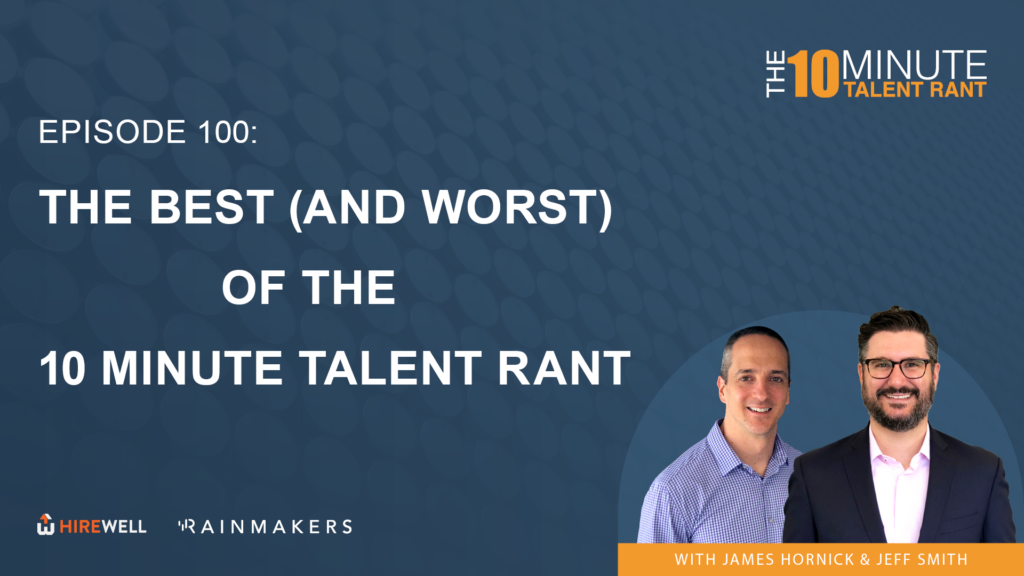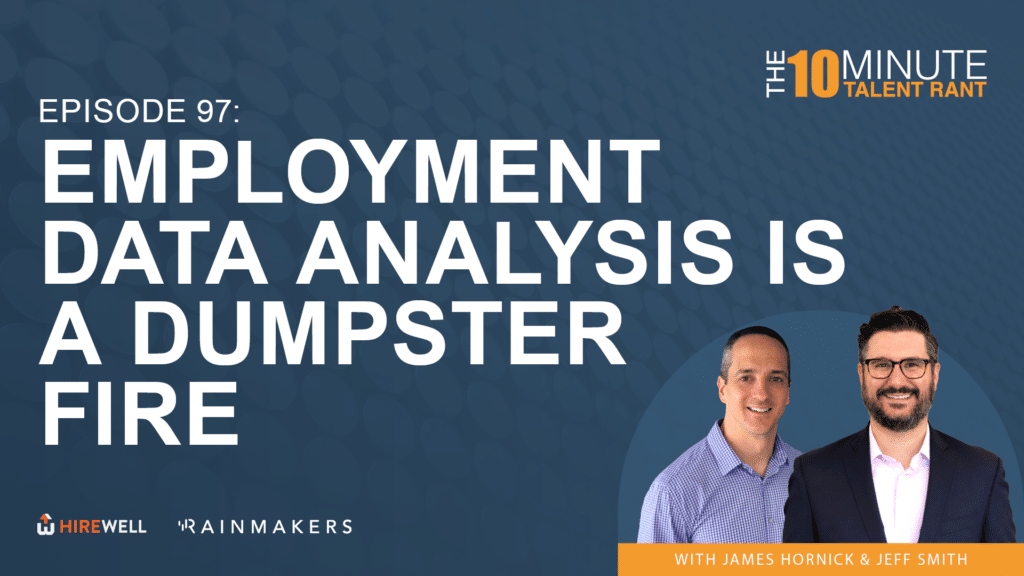The 10 minute talent rant is live. I’m James Hornick joined by Jeff Smith and we are on the clock. The 10 minute talent rant is our ongoing series where we break down things that are broken in the talent acquisition and hiring space, maybe even pitch a solution or two. Before we dig in, all of our content can be found at talentinsights.hirewell.com.
This week’s topic, are we sure we want salary transparency? I gotta say your lead is, it gets better by the week. I know. Fantastic. All right, so reiterating, are we sure we want salary transparency? So I want to set some ground rules. Just some quick statements. First and foremost, we at Hirewell, we specifically, we believe in pay equity for in terms of gender, race, sexual orientation, et cetera. Meaning none of that should have any bearing on how you get paid.
So very, very clear there. We also believe or at least I think that the government both locally and federally ” mean well’. The quotes up, you know, when it comes to addressing these types of issues and that’s why these things are coming up. When they’re making laws, the laws are intended to promote- address the pay gap. Indeed.
And finally, like this isn’t a left versus right, conservative versus liberal thing. Let’s stop with all of that, but specifically with this. Politicians don’t always fully understand the domains that they legislate. So laws are made every day by both sides that in hindsight make absolutely no sense.
That’s something I can agree with. Okay. So what we want to talk about specifically was Colorado’s equal pay for equal work act and how it has unintended consequences and the larger conversation about this, about pay transparency. First time I heard about this was I think this went into effect in January of this year.
So it’s actually been almost a year, but the first time I heard about it was like over the summer. Someone shot me like a Wall Street Journal article about how people in Colorado are getting excluded from jobs and whatever. I’m like, it’s just fake news. I haven’t- I’m in recruiting. You’re telling me this happened six months ago?
I’ve never seen it and they’re saying it’s a- wow! Three to four months later, I’m seeing it constantly. I’m seeing it- I mean, I’m hearing about companies who are trying to avoid Colorado candidates. I did a search just in Indeed just to see like how real a thing it was. It was software engineers, plus Colorado in a remote setting.
I found first off, tons of jobs that the pay ranges are 50 to 60K wide. So there’s the range. So we don’t say how much this job pays, like anywhere between 80 and 150, hypothetically. That wasn’t really, like, I don’t think that really addresses anything in terms of pay fairness, but whatever.
And then I did find it’s not that hard to find jobs that specifically call out no Colorado candidates. There are companies who are straight up blackballing, blacklists and people who live in Colorado, just because they don’t want to have to deal with legislation and laws there. So if you live in Colorado that kinda sucks. Yeah, no it’s absolutely a real thing.
We saw a few instances, literally it says fully remote, except for Colorado- not illegal to specify that either. Pay transparency is like one of those things that on the surface, everyone kind of agrees with. Like Nirvana, pie in the sky, like sounds fair. Everyone feels a little- everyone’s annoyed when they go and look for jobs and they don’t know what the range is when they apply.
Every time someone complains about it, it goes viral on LinkedIn. Everyone please post the salary, post their salary. As if like everyone is like, maybe there’s another aspect they’re missing here, but continue. Yeah, no, no. It’s exactly why we ended up spam applying to everything because we want more chances at the off chance that we’re going to hit
the one that’s paying 200 grand. I think the reality here is pay transparency and pay for performance are conflicting forces. They fight against each other. So what do we mean by that James? Let’s start with pay transparency, what it really means at its core. If you take that to the extreme, true pay transparency, that means everyone knows what everyone else is
making. Everyone at your company, everyone at everyone else’s company, every one in the world, everyone knows exactly what everyone’s salary ranges are. When it’s one person, then that’s one thing. But when you’re talking about the entire workforce, it’s enormous. You’re asking, is everyone truly worth the same amount in terms of their skill and ability to do a same job?
So like the idea of pay transparency assumed so at some point, because of everyone’s finding out what everyone else is making, you’re trying to keep the peace. Then you have to on somewhat level, agree with that. Yup. The point then becomes worth is totally subjective- like let’s be clear. In terms of pay, right,
you’re interviewing and somebody is assessing that value real time. It’s why previous compensation has been used for decades if not longer, potentially centuries as the barometer on which we collectively negotiate. Neither side wants to lose in that exchange. And so when you have things like current compensation, it’s a lot easier to assess like fair market value.
I’ve had many instances, at least with the Illinois laws coming into effect where the discussion of current compensation and the barring of figuring that out has literally forced people into overvaluing where they’re at, as it relates to the market. And in a lot of instances, jobs that they would have been perfectly suited for
they overpriced themselves. And so it comes down to this idea, like, yes, like I want to be a millionaire. We all want to be millionaires, but like just saying I want to be a millionaire, it doesn’t like poof make it happen, right? Here’s another way of saying it. Have you ever worked with someone at your level, in the same role, same company who sucked?
Do you think that person should have been paid the exact same amount you’re being paid? Guess what? If you believe that they shouldn’t, you believe in pay for performance, which is the opposite of that. Yep. Another way of saying it, do you believe that your salary is no one else’s business?
Should everyone know what your salary is? So what does pay performance really mean? Let me go through it. So crazy concepts like metrics-based incentives and paying your top performers more generally because they achieved a sales number or attainment or exceeding goals and setting expectations and having that impact, like their performance bonus and anything else like that. Any of these things starting to ring a bell?
Literally everyone thinks they should be paid more than poor performers, unless they’re the poor performer, then they complain about it. Exactly. Disclaimer time- like we get it. We understand that the idea of paid performance can be subjective and open to bias. I don’t think, we’re not saying that’s the answer.
I’m absolutely not saying that’s the answer either. Despite the fact how hard it is laid to sarcasm. Yeah, it really is. But it does readdress the idea, like how can we believe in higher pay for better for performance while also being transparent with our employees about what everyone’s making at all times. You’re creating an untenable, chaotic environment.
You mainly want to get it on bitterness? Like there’s going to be a lot of like spite in this environment. Yeah. So trying to keep your culture and trying to keep it like a positive work environment when this is going on, when everyone else, knows what everyone else is making.
There are interesting examples out there that tout that they can do it. However, I’m very skeptical that that’s actually like the norm. All right. So this is just one state. Now here’s the thing. That’s just one law. Other states are going about this in a very different way, and I’m very interested to see how this pays off.
So specifically I want to call some Connecticut, Nevada, they must provide salaries to job seekers either when extending an offer were after initial interview. So the big difference there is they’re not publishing on the internet, but they do have to tell them very early in the process. So it still allows for some level of discretion while still getting the information to job seekers very early.
Rhode Island will have to provide candidates pay information during interviews, even if the candidates don’t request the information. So if you don’t realize you need to ask for it, doesn’t matter. In Rhode Island in 2023 they have to tell you no matter what. Right. Maryland, California, Washington, a couple of cities in Ohio require- employers required to disclose pain information
at some point in the hiring process, only if the job seekers request it. I don’t know, let’s be honest. Most companies are going to have to give them certainly broad range back anyways. So I don’t know. Yeah, so that’s what other states are doing. Just kinda throwing it out there, but I tend to think that maybe somewhere a little bit, a step later might be able to keep the peace better, but I guess we’ll see.
Yeah. I mean, look, the main takeaways are laws like the Colorado law cannot eliminate the wage gap because there’s obvious loopholes. We’ve mentioned it three times now. When somebody can put pay range 50,000 to $500,000 and like get away with it, that’s a problem. Yeah. Realize also in a fully remote world, it’s having the opposite intended effect.
There’s less opportunity for people who live in Colorado, full stop. One hundred percent. They’re being blacklisted from opportunities without knowing it. Took me two seconds to find job postings that say no Colorado candidates. And it’s all because companies, their HR departments are being forced to turn into legal departments because they’re more worried about compliance because they’re afraid of breaking a law and getting sued for it than they are about creatively hiring the best talent.
Lots of Toby’s. You wanted an office plug, there it is. Look, there’s no perfect answer here. I think, you know, if you’re listening, you realize that it is a more complex issue than “post the damn salary” Agreed. I’ll give that the 100 emoji. Anyways, we’re short on clock. That’s a wrap for this week.


















